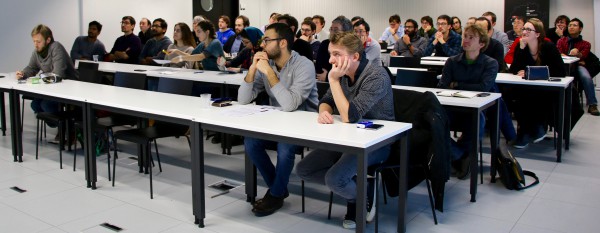MARVEL Junior Seminar — October 2024

Each seminar consists of two presentations of 25 minutes each, allowing to present on a scientific question in depth, followed by time for discussion. The discussion is facilitated and timed by the chair.
Pizzas will be served after the seminars in order to facilitate discussions based on the talks just presented.
Onsite participation
12:15 — Seminars take place in EPFL room Coviz2 (MED 2 1124)
~13:15 — Pizzas will be served in the MED building atrium, second floor
Online participation
Starting at 12:15:
https://epfl.zoom.us/j/68368776745
Password: 1923

Abstracts
Talk 1 — Variational quantum computing and classically simulability
Manuel Rudolph
Laboratory of quantum information and computation (QIC), EPFL
Quantum computers have been presented as a powerful new tool for various applications, but what these devices do operationally is often shrouded in mystery. In this talk, we will approach quantum computers from a classical simulation perspective. We will discuss various methods for simulating the outcomes of quantum computations, and which properties of quantum algorithms make them hard to reproduce classically. One particular focus will be a method called Pauli propagation, which is currently being pioneered by the group of Prof. Zoë Holmes at EPFL. By this, we will narrow down what quantum computers may be used for before and perhaps after quantum error correction becomes viable.
Talk 2 — Conductivities of SSE at hybrid DFT level: the machine learning way
Davide Tisi
Laboratory of computational science and modelling (COSMO), EPFL
Lithium ortho-thiophosphate (Li3PS4) is a promising solid-state electrolyte for batteries, yet the microscopic mechanisms governing Li-ion transport within it remain unclear.
Moreover, no computational work has computed the thermal conductivity at the DFT level. In this talk, I will show how we build machine learning potentials trained over state-of-the-art DFT references (PBEsol, SCAN, and PBE0), to study the electrical [1] and thermal conductivity [2] of all the known phases of Li3PS4 (α, β and γ), for large system sizes and timescales. I will discuss the physical origin of the observed superionic behaviour of Li3PS4: where the PS4 flipping drives a structural phase transition to a highly conductive phase, characterised by an enhancement of Li-site availability and by a drastic reduction in the activation energy of Li-ion diffusion. I will show the effect of the phase transition on both the electrical and thermal conductivity. We elucidate the role of inter-ionic dynamical correlations in charge transport by highlighting the failure of the Nernst-Einstein approximation to estimate the electrical conductivity. Finally, we will discuss how thermal conductivity presents two distinct behaviours: low and constant with temperature for the α and β phases, and a phonon-like behaviour for the γ phase.
[1] L. Gigli, D. Tisi, F. Grasselli and M. Ceriotti, Mechanism of Charge Transport in Lithium Thiophosphate, Chem.
Mater. 2024, 36, 1482−1496
[2] D. Tisi, F. Grasselli, L. Gigli and M. Ceriotti, Thermal conductivity of Li3PS4 solid electrolytes with ab initio accuracy, Phys. Rev. Materials 8, 065403, 2024
Check the list of the next MARVEL Junior Seminars here.
Low-volume newsletters, targeted to the scientific and industrial communities.
Subscribe to our newsletter